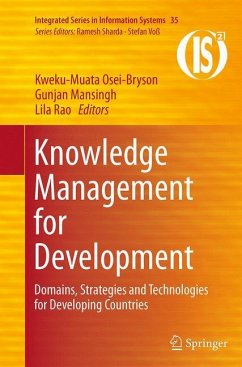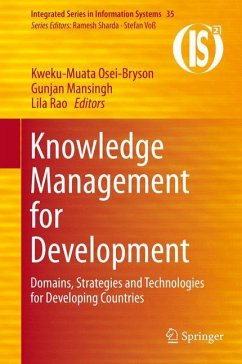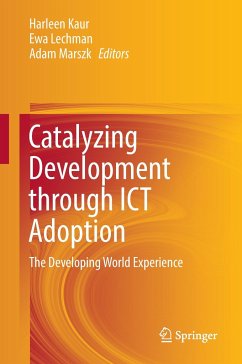
Knowledge Management for Development
Domains, Strategies and Technologies for Developing Countries
Herausgegeben: Osei-Bryson, Kweku-Muata; Mansingh, Gunjan; Rao, Lila
Versandkostenfrei!
Versandfertig in 6-10 Tagen
76,99 €
inkl. MwSt.

PAYBACK Punkte
38 °P sammeln!
A number of developing countries, including small island states have common problems that have affected their development and growth. Knowledge Management (KM) initiatives can be used to address some of these issues, but these developing countries need to understand what is needed to implement them, in order to improve economic conditions. While many of these countries have access to technologies that can be used to assist in knowledge management, relevant and low cost KM initiatives need to be considered in improving their existing KM processes. Sectors critical to the growth of these develop...
A number of developing countries, including small island states have common problems that have affected their development and growth. Knowledge Management (KM) initiatives can be used to address some of these issues, but these developing countries need to understand what is needed to implement them, in order to improve economic conditions. While many of these countries have access to technologies that can be used to assist in knowledge management, relevant and low cost KM initiatives need to be considered in improving their existing KM processes. Sectors critical to the growth of these developing countries include health care, crime management, disaster recovery management, small and medium size enterprise development. Knowledge Management for Development: Domains, Strategies and Technologies for Developing Countries highlights the opportunities in these sectors and provides advice as to how these countries should go about understanding, building and adopting the relevant KM strategies and technologies. This book identifies appropriate technologies which should be considered to increase productivity within the identified sectors in the developing countries and also sectors in where knowledge management initiatives can yield maximum value. It also considers the constraints of these territories, recommending appropriate technologies and strategies for KM initiatives. It provides advice on how these technologies should be adopted in these sectors of developing countries. Investing in these strategies should benefit these countries development and growth.














